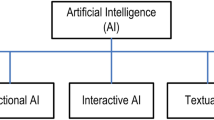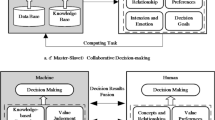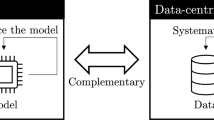Abstract
Workflow management systems (WfMSs) based on agent technology can cope with the rapidly evolving business environment better than most other systems as they are more flexible and open. In this paper we describe a possible architecture of such a system by means of our prototype WfMS called JBees. The combination of collaborating agents and the Coloured Petri Net (CPN)-formalism in JBees enables a flexible and adaptive system with the possibility of simulation, analysis, and monitoring of the process execution in order to identify potential inconsistencies and to provide appropriate information to the workflow administrator for the purpose of the process improvement.









Similar content being viewed by others
References
van der Aalst WMP (1996) Three good reasons for using a Petri-net-based Workflow Management System. In: Navathe S, Wakayama T (eds) Proceedings of the international working conference on information and process integration in enterprises (IPIC 1996), Cambridge, pp 179–201
van der Aalst WMP (2001) Exterminating the dynamic change bug: a concrete approach to support workflow change. Inf Syst Front 3(3):297–317
van der Aalst WMP, van Hee K (2002) Workflow management: models, methods, and systems. MIT Press, Cambridge
van der Aalst WMP, Basten T, Verbeek HMW, Verkoulen PAC, Voorhoeve M (1999) Adaptive workflow: an approach based on inheritance. In: Ibrahim LM, Drabble B (eds) IJCAI 1999 Workshop on intelligent workflow and process management: the new frontier for AI in business, pp 36–45
van der Aalst WMP, Hofstede AHM, Kiepuszewski B, Barros AP (2002) Workflow patterns. Technical report, Queensland University of Technology http://tmitwww.tm.tue.nl/research/patterns/
Bandinelli S, Fuggetta A, Ghezzi C (1993) Process model evolution in the spade environment, Technical Report No. 14, ESPRIT-III Project GOODSTEP (6115). IEEE transactions on software engineering, 19(12):1128–1144
Bradshaw J (1997) An introduction to software agents. In: Bradshaw J (ed) Software agents. MIT Press, Cambridge, pp 3–46
Chen Q, Hsu M, Dayal U, Griss ML (2000) Multiagent cooperation, dynamic workflow and XML for ecommerce automation. In: 4th international conference on autonomous agents, Barcelona, Spain
Cui B, Odgers Z, Schroeder M (1998) An in-service agent monitoring and analysis system. In: 11th IEEE international conference on tools with artificial intelligence, Chicago, USA, pp 237–244
Department of Information Science, University of Otago. JBees. http://jbees.sourceforge.net (2004)
Fleurke M (2004) JBees, an adaptive workflow management system—an approach based on petri nets and 10 Lars Ehrler et al. agents. Master’s Thesis, Department of Computer Science, University of Twente
Fleurke M, Ehrler L, Purvis M (2003) JBees—an adaptive and distributed framework for workflow systems. In: Ali Ghorbani, Stephen Marsh (eds) Workshop on collaboration agents: autonomous agents for collaborative environments (COLA). Halifax, Canada, pp 69–76 http://www.cs.unb.ca/∼ghorbani/cola/proceedings/NRC-46519.pdf, 2003. National Research Council Canada, Institute for Information Technology
Free Software Foundation (2000) GNU Lesser General Public License
Jensen K (1992) Coloured Petri nets—basic concepts, analysis methods and practical use, vol 1. Basic concepts. EATCS monographs on theoretical computer science. Springer, Berlin Heidelberg New York
Jennings NR, Faratin P, Norman TJ, O’Brien P, Odgers B (2000) Autonomous agents for business process management. Int J Appl Artif Intell 14(2):145–189
Joeris G (2000) Decentralized and flexible workflow enactment based on task coordination agents. In: 2nd international bi-conference workshop on agent-oriented information systems (AOIS 2000 @ CAiSE*00), Stockholm, Sweden, iCue Publishing, Berlin, pp 41–62
Meilin S, Guangxin Y, Yong, Shangguang W (1998) Workflow management systems: a survey in proceedings of IEEE international conference on communication technology, scw.cs.tsinghua.edu.cn/cscwpapers/ygxin/WfMSSurvey.pdf
Muehlen MZ, Rosemann M (2000) Workflow-based process monitoring and controlling—technical and organizational issues. In: 33rd Hawaii international conference on system sciences, Maui, HI, USA
Nissen ME (2000) Supply chain process and agent design for E-commerce. In: 33rd Hawaii international conference on system sciences
Nowostawski M, Bush G, Purvis MK, Cranefield S (2001) A multilevel approach and infrastructure for agent-oriented software development. In: International workshop on infrastructure for agents, MAS and Scalable MAS, http://www.umcs.maine.edu/∼wagner/workshop/01 nowostawski bush purvis et al.pdf, 2001
Nowostawski M (2003) JFern—Java-based Petri net framework
Purvis M, Purvis M, Lemalu S (2001) A framework for distributed workflow systems. In: 34th Annual Hawaii international conference on system sciences (HICSS-34)
Purvis MK, Cranefield S, Nowostawski M, Carter D (2002) Opal: a multi-level infrastructure for agent-oriented software development. The information science discussion paper series no 2002/01, Department of Information Science, University of Otago, Dunedin
Savarimuthu BTR, Purvis M, Fleurke M (2004) Monitoring and controlling of a workflow management system. In: Proceedings Australasian Workshop on Data Mining and Web Intelligence (DMWI2004)
Schael T (1998) Workflow management systems for process organisations. Lecture notes in computer science, vol 1096. Springer, Berlin Heidelberg New York
Shepherdson JW, Thompson SG, Odgers B (1998) Cross organisational workflow coordinated by software agents. In: CEUR workshop proceedings No 17 cross-organisational workflow management and coordination, San Francisco, USA
Shoham Y (1997) An overview of agent-oriented programming. In: Bradshaw J (ed) Software agents. MIT Press, Cambridge, pp 271–290
Stormer H (2001) AWA—a flexible agent-workflow system. In: Workshop on agent-based approaches to B2B at the 5th international conference on autonomous agents (AGENTS 2001), Montreal, Canada
Sycara KP (1998) Multiagent systems. AI magazine 19(2):79–92
The workflow management coalition (1995) The workflow reference model
Wang M, Wang H (2002) Intelligent agent supported flexible workflow monitoring system. In: Advanced information systems engineering: 14th international conference, CAiSE 2002, Toronto, Canada
Wooldridge MJ (1999) Intelligent agents. In: Weiss G (ed) Multiagent systems. MIT Press, Cambridge, pp 27–77
Acknowledgements
The authors wish to thank Mariusz Nowostawski for his help in implementing the system and improving JFern, and Prof. Martin Purvis for supporting this work. This work has been supported by the Otago Research Grant ORG-0103-0304. Lars Ehrler thanks the Evangelisches Studienwerk Villigst e.V., Schwerte, Germany, for their financial support.
Author information
Authors and Affiliations
Corresponding author
Rights and permissions
About this article
Cite this article
Ehrler, L., Fleurke, M., Purvis, M. et al. Agent-based workflow management systems (WfMSs). ISeB 4, 5–23 (2006). https://doi.org/10.1007/s10257-005-0010-9
Published:
Issue Date:
DOI: https://doi.org/10.1007/s10257-005-0010-9




